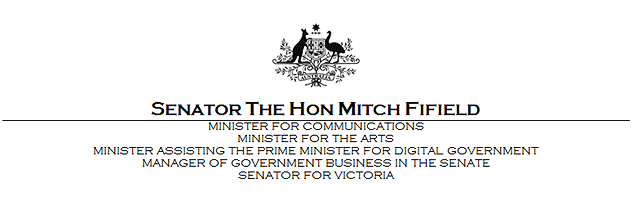30 October 2015
8.15 am
E & OE
Subjects: NBN, media reform
BRISSENDEN:
Senator Fifield we’ve spoken with locals in South Western Queensland and far Western Queensland who say they have some of the worst internet service in the country. Some people in small towns and rural properties say it’s hampering their business opportunities and making it harder to give their children a proper education. It is a pretty bad situation for them at the moment isn’t it?
FIFIELD:
Look there is no doubt that there’s high levels of frustration particularly in regional areas with broadband speeds which is why we’re working incredibly hard to roll out the NBN nationwide and why we’re pursuing what we call a multi-technology mix approach. Which will see us able to roll the NBN out nationwide 6 to 8 years sooner than otherwise would have been the case, and at 20 to 30 billion dollars less cost.
BRISSENDEN:
So it’s pretty hard to push a message of innovation thought if you can’t get your internet to work though isn’t it?
FIFIELD:
Look, I fully appreciate the frustration. One of the great benefits of having fast broadband nationwide will be, not only will people in regional areas have the opportunity to stay there and to do their business, to do their work, but also people in metropolitan areas will have a greater choice about where they do their work and will have much more opportunity to embrace the great lifestyle that regional Australia offers.
BRISSENDEN:
The Sky Muster satellite was launched, well a few weeks ago now, due to be switched on next year. It will still mean though that there’s fairly limited capacity, particularly when people out in the bush can only get 5 megabits of upload and the download speeds are good, but the upload speeds are still going to be too slow for some things.
FIFIELD:
Well, it’ll still be a significant improvement on the current situation. I appreciate that there is some scepticism about the long term satellite that the NBN will offer. And that’s because the experience that people have had with the interim satellite service has been so appalling. The previous government simply didn’t purchase enough space on the interim satellite which means that a cap was reached very quickly and the quality of the service that people are receiving is deteriorating. So huge frustration. Understandable frustration. Understandable scepticism about satellite services as a result. But the long term satellite service will be a dramatic improvement on what people are currently experiencing.
BRISSENDEN:
Is there a danger though that, that will also reach a cap pretty quickly?
FIFIELD:
It’s very important to make sure that NBN manage the capacity of the satellite well. NBN is going to be developing what’s called a fair use policy. To make sure some of the important community uses don’t get crowded out. But the long term satellite will have capacity for about 400,000 premises. Probably eventually about half that number are expected to subscribe. So there is good capacity and we’re also going to have a second satellite to make sure that we’ve got inbuilt redundancy.
BRISSENDEN:
Okay. Just on another regional issue which is the media laws. There are reports that your Government is about to give the new round of media changes the nod. Have you started talks with the Senate crossbench about scrapping the reach rule?
FIFIELD:
Look I’m chatting all my parliamentary colleagues. Regional colleagues. Coalition colleagues. Labor Party colleagues. Crossbench colleagues. And those discussions are well underway.
BRISSENDEN:
What response have you got then?
FIFIELD:
I’ve got to say the response has been pretty positive. There’s been a recognition, because it’s hard to deny, that our media laws do not reflect the world that we live in. That they were crafted in a pre-digital age, for a pre-digital age. Regional TV operators in particular, want to have the freedom to configure their businesses in the way that can make them most viable. That’s the strong message that I’m getting from my regional colleagues in particular.
BRISSENDEN:
So it sounds like the reach rule which prevents major networks from buying regional affiliates is about to be scrapped?
FIFIELD:
Well that’s one of the things that’s on the table. I’m not being specific about what the elements of media reform package may be. It’s important to go through good Party Room and good Cabinet processes. But there is no doubt that it’s reasonable and appropriate that we as a government look to make our media laws fit for purpose so they reflect the world that we live in.
BRISSENDEN:
Okay we’ll leave it there, thanks very much Senator Fifield.
FIFIELD:
Thanks Michael.
Media contact:
Justine Sywak | 0448 448 487 | Justine.sywak@communications.gov.au

